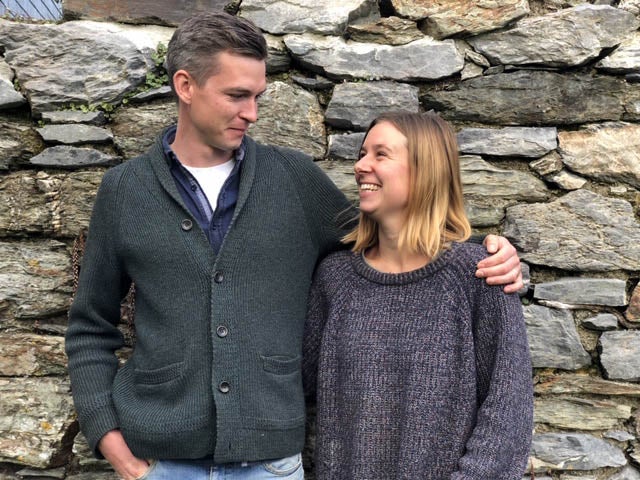Five minutes with... Ethan and Hazel Friskney-Bryer: ‘Being a farmer is a calling – you have to really love it’
After the pandemic put the couple’s restaurant day jobs on hold, they’ve turned a desolate spot into a sustainable food source. Lizzie Rivera catches up with them


Your support helps us to tell the story
This election is still a dead heat, according to most polls. In a fight with such wafer-thin margins, we need reporters on the ground talking to the people Trump and Harris are courting. Your support allows us to keep sending journalists to the story.
The Independent is trusted by 27 million Americans from across the entire political spectrum every month. Unlike many other quality news outlets, we choose not to lock you out of our reporting and analysis with paywalls. But quality journalism must still be paid for.
Help us keep bring these critical stories to light. Your support makes all the difference.
Couple Ethan and Hazel Friskney-Bryer work as a chef and front of house at seasonal restaurant Fitzroy in Fowey, Cornwall, which is part of the Primeur, Westerns Laundry and Jolene group of restaurants.
During lockdown, they found themselves transformed into farmers, turning an abandoned walled garden into a kitchen plot teeming with abundance that they used to feed themselves and supply local farm shops during the pandemic. It is now a main source of vegetables served at Fitzroy.
It’s been a tough year for restaurants. How is Fitzroy faring?
When restaurants were allowed to reopen, it was a very busy summer.
We’re now officially closed for winter, but opening four times a month for pop-ups with a menu based around what we grow in our walled garden, which we’re excited about.
Cornwall is a very seasonal place – last year we stayed open 11 months of the year, and sometimes we were a team of eight serving four guests. We can’t afford to do that this year.
Tell us more about your walled garden...
We had a team day out to Trefrawl Farm, our native beef supplier, late last year. They had a walled garden and asked if we knew anyone who wanted to do anything with it, so we jumped at the chance to turn into a kitchen garden for Fitzroy.
We were incredibly naive and had no idea what we were taking on. It’s pretty big, about 40m by 50m and we thought we could manage it around our day jobs but it was never going to be possible.
The pandemic hit and suddenly we were there all day every day while the restaurant was closed.
What do you grow?
This summer we planted a herb bed, around 15 types of lettuce, 10 types of tomato, raspberries, strawberries, rhubarb, buckwheat and quinoa… to name a few!
There’s also an established pear tree and an apple tree and four wildflower patches. Right now we’re growing mustard leaves, jerusalem artichokes, squash, and root vegetables.
We should have been more selective and grown more of each thing, but we didn’t listen to that advice! We didn’t know what would work and what wouldn’t, so this year was about experimenting.
What was your goal? And your biggest lesson?
Our goal was to learn more about growing food.
As a chef who works closely with producers I felt I had an appreciation for what goes into producing food, but I had no idea how hard it is or how little money there is in farming.
Like teaching, it has to be calling – to be a farmer you have to be a bit nuts and you have to love it.
Fitzroy prides itself on being a seasonal and sustainable restaurant and your speciality is fish. What does nose-to-tail eating mean when it comes to fish?
In the UK, a third of the fish never makes it onto the plate so we try to minimise further waste.
Firstly, we try to offer a whole spectrum of what’s available in the sea, not just the most popular fish.
Then, we serve the whole fish, so fish heads are an item in their own right on the menu.
We grill them, rest them in fish stock with lemon juice and it forms a delicious, gelatinous sauce, so they’re served with bread. If there’s roe, we cure that for seasoning or salads. We use the fins for fish stock.
How do you make fish heads and hake throat sound appealing to your guests?
We take the time to explain what we’re doing and why it’s delicious and we price it sensibly.
A table of four can order a £6 fish head alongside their mains, with minimal risk and hopefully maximum reward.
A breadcrumbed and deep fried hake throat is the best fish finger you’ll ever have!
What can your guests expect from your pop-ups?
A stripped back version of what we offer at Fitzroy; the same type of food where we really allow the produce to shine, but with a four-course set menu.
The menu is designed around the vegetables we’re growing and local produce – so there’ll be pickled and preserved vegetables from summer as well as mustard leaves and Jerusalem artichokes and game pies and roast turbot.
October is almost sold-out already so we’ve had to add an extra date.
Your story is featured on the upcoming ‘Who Feeds Us?’ podcast, which is calling to restore dignity in food. What does this mean to you?
Us all having a greater understanding, and appreciation of where our food comes from – and people who produce our food being able to earn a decent living and not having to live hand to mouth.
Ethan and Hazel are featured in the new podcast series Who Feeds Us? by Farmerama starting on Sunday 11 October



Join our commenting forum
Join thought-provoking conversations, follow other Independent readers and see their replies
Comments